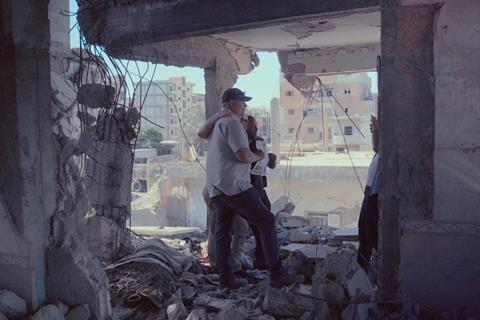Eye-popping documentary follows so-called ’war tourists’ to active front lines

Dir: Vita Maria Drygas. Poland/UK. 2023. 93mins
With the world torn apart by conflict from Ukraine and Gaza to Afghanistan and Somalia, it’s difficult to imagine anyone responding to horrific daily news reports with anything but horror and sympathy. Yet there is a group of people for whom an active front line is a tempting holiday destination; so-called ’war tourists’ — although some would dispute that term — who pay top dollar for individually-curated trips to active front lines. In her compelling, eye-opening documentary, Lithuania-born Polish director Vita Maria Drygas follows a handful of such travellers, and attempts to understand what drives them.
Viewers are invited to make their own judgements
Taking a measured approach to a controversial topic, Danger Zone should appeal to further festivals following its premiere at Warsaw and subsequent IDFA berth; it certainly makes for an intriguing programming option alongside the myriad humanitarian and first-person documentaries coming out of conflict zones. Theatrical play is also not out of the question.
War tourism is not well known. Drygas herself had not heard of it until she saw an advert for front-line travel while filming her 2015 mid-length documentary Piano in Ukraine. It is a secretive activity, organised by underground companies like War Zone Tours which is owned and operated by American Rick Sweeney. They don’t advertise but, says Rick, they still receive numerous enquiries every day. These are from tourists like Eleonora, an Italian woman living in Las Vegas, and British man Andrew who are happy to spend thousands of dollars for trips to the world’s hottest conflict zones.
And so Drygas, together with cinematographers Bartosz Bieniek and Mateusz Wajda, follow Eleonora to Kabul, where she tells her fixer that she wants to see “whatever is possible involving the weapons” — she ends up firing a rifle with the military, changing from her Birkenstocks into army boots for a selfie. Andrew, meanwhile, takes American newbie AJ to Mogadishu, where they play heavy rock music in their armoured vehicle as they travel to bullet-ridden neighbourhoods then, later, watch the glow of gunfire on the horizon from their hotel rooftop.
Adopting a silent, observational approach, Drygas keeps her focus on these tourists but is unflinching in her depiction of the war zones to which they travel. Through the candid juxtaposition of the behaviour of her subjects and the nightmarish realities unfolding around them, viewers are invited to make their own judgements. It is difficult to watch these privileged Westerners pick through the rubble of a destroyed apartment building, still strewn with personal belongings, for souvenirs, take selfies next to a stained execution wall or, in Andrew’s case, insist on staying overnight on the front line against the advice of security guards — something to add to his endless bragging list of life-threatening experiences. Worse still is when Andrew and AJ visit refugee camps full of women and children, handing out fistfuls of dollars and a few meagre cuddly toys — and promptly leave when things get too uncomfortable.
In between these scenes, Eleonora, Andrew and AJ sit in their comfortable homes and talk about their motivations; all are admirably open, if not entirely convincing. Eleonora, for example, speaks about her difficult relationship with her family, her desire to be a “witness” to real history; she makes a genuine connection with one of her Afghan hosts but is naive to the ways in which she can actually help. Andrew, meanwhile, is honest about the fact that daily life with his wife and two young children is simply not enough, that he needs to experience more. And AJ comes across as an adrenaline junkie looking for the ultimate fix – and, perhaps, biting off more than he is willing to chew.
Yet, as the sombre music from Kārlis Auzāns and intense, fly-on-the-wall editing by Milenia Fiedler and Kamil Niewiński indicates, these are nowhere near good enough reasons to put yourself in the line of fire in the name of fun. Ultimately, Danger Zone makes the rather obvious point that, for so many people, conflict is not a spectator sport, and that to treat it as such is an entirely selfish endeavour.
Production companies: Drygas Film Production
International sales: Dogwoof sales@dogwoof.com
Producers: Vita Żelakeviciute
Cinematography: Bartosz Bieniek, Mateusz Wajda
Editing: Milenia Fiedler and Kamil Niewiński
Music: Kārlis Auzāns























